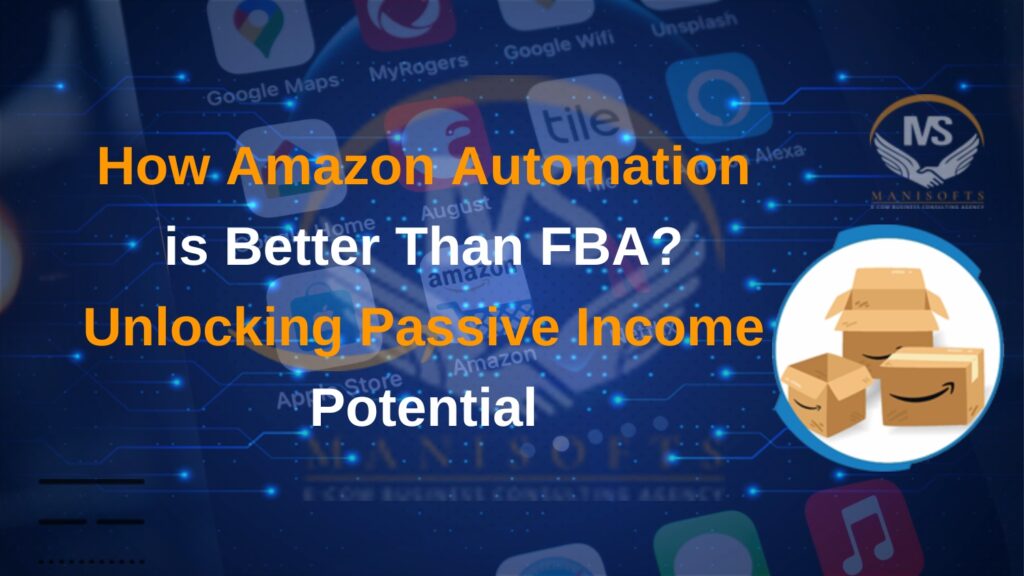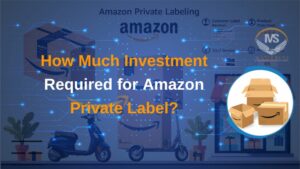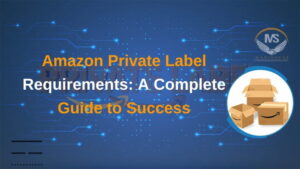Find out How Amazon Automation is Better Than FBA. Check out the advantages of non-interference management, specialist tuning, and faster growth rates. Discover what you need to do to get the most out of your e-commerce website without having to do much!
Introduction
Amazon Automation is a service that relieves professionals of the responsibility of an Amazon store, including product acquisition, listing enhancements, marketing, and customer care so that people can enjoy its profits while their online businesses grow. Different from FBA, you get to be much more in charge, where you send your products to Amazon for storing, packing, and shipping but handle the inventory and sales, marketing on your own. Both types offer exposure to Amazon’s vast customer base and excellent delivery services, although they differ vastly in regard to administration and implementation. While Amazon Automation means that some of the tasks are done by other people, so you can focus on other, FBA makes you a part of the process and you can control what level of engagement you want to have in your business.
Benefits of Amazon Automation Over FBA
Hands-off Business Management
How would you like to earn profit while asleep or even while shopping, for example? That is what Amazon Automation does for you. Think about not having to negotiate with suppliers, advertise your products or services, or have stocks in mind—there are professionals for all those things. You just collect the profits.
Expertise and Optimization
It is not only outsourcing; you are hiring skilled people who are fully aware of the Amazon strategies you cannot even perceive. These pros understand the potential of products for promotion, the algorithms of presentation, and the incredible art of stock management. In this case, you get the advantage of outsourcing while they handle it, putting their expertise to good use, you can concentrate on other business or just free time.
Scalability and Growth Potential
It may turn to be herewhen managing a business, let alone an Amazon store especially when you are in the growth stage. As you will have understood with Amazon Automation, for example, scaling is extremely simple. Your ability to extend your product portfolio and raise your revenues is virtually boundless because your automation companion does all the job. In the same respect all powers of the business are left for you to develop and yet the business runs well.
Reduced Risk of Operational Errors
Forget the headaches of managing day-to-day operations. Automation reduces the risk of errors—no more stockouts, mismanaged listings, or customer service slip-ups. The professionals you hire keep things running smoothly, minimizing mistakes that can eat into your profits.
How Amazon Automation is Better Than FBA?
In the world of e-commerce, Amazon’s Fulfillment by Amazon (FBA) has been a go-to option for sellers looking to simplify logistics and shipping. However, Amazon automation is quickly emerging as a superior solution for many sellers who want a more streamlined, scalable, and hands-off approach. Here’s how Amazon automation can outperform FBA in key areas:

1. Reduced Seller Involvement
FBA still requires sellers to manage several aspects of their business, such as product sourcing, inventory tracking, and some elements of customer service. Amazon automation, on the other hand, takes automation to a higher level by handling nearly every part of the selling process. From product sourcing to customer interactions, automation tools or services can do much of the heavy lifting, allowing sellers to take a more passive role in their business.
2. Lower Operating Costs
While FBA can handle storage and shipping, the fees associated with these services can add up, particularly for long-term storage. With automation, sellers can optimize their inventory management by using tools that predict demand and restock products accordingly. This helps reduce overstocking, which in turn minimizes storage fees. Additionally, automation often integrates with third-party fulfillment centers, offering more flexibility and often lower costs than FBA’s standard fees.
3. Inventory Management & Demand Forecasting
FBA requires sellers to manually monitor stock levels and replenish inventory, which can be a time-consuming process. Amazon automation platforms provide advanced analytics and forecasting tools that predict future sales trends, allowing sellers to maintain optimal stock levels without constant monitoring. This automation reduces the likelihood of stockouts or overstocking, ensuring smoother operations and improved cash flow management.
4. Enhanced Customer Experience
With FBA, Amazon handles most shipping and customer service issues related to logistics. However, for product-related inquiries, sellers are still required to engage with customers. Amazon automation can enhance the customer experience by integrating automated customer service solutions that handle both logistics and product-related inquiries more efficiently. This creates a more seamless customer experience, leading to better reviews and higher customer satisfaction.
5. Scalability with Ease
FBA is effective for small and mid-sized sellers, but scaling with FBA can become increasingly complicated as you grow. Expanding product lines, managing warehouses, and maintaining high-level service can overwhelm even experienced sellers. Amazon automation simplifies scaling by automating key operations like multi-channel selling, order fulfillment, and supply chain management, allowing businesses to grow without the typical manual effort involved in expanding through FBA.
6. Greater Control Over Business
With FBA, Amazon controls much of the customer experience, from packaging to delivery, which limits sellers’ ability to build their brand. Amazon automation, however, gives sellers more control over their business, allowing them to customize the customer experience. Sellers can choose their own fulfillment solutions, set their own packaging standards, and directly engage with customers, giving them the opportunity to build stronger relationships and brand loyalty.
7. More Flexible Fulfillment Options
FBA’s structure limits sellers to using Amazon’s fulfillment services, which may not always be the most cost-effective or efficient option. Amazon automation can integrate with a range of third-party fulfillment centers, allowing sellers to choose the fulfillment method that works best for them. This flexibility can lead to reduced shipping costs, faster delivery times, and a more tailored customer experience.
Cost Comparison: Amazon Automation vs. FBA
Upfront Costs in Amazon Automation
Of course, Amazon Automation entails higher initial investments – you are buying the best service. But consider it a cost in acquiring time and generating confidence that your financial management will be professional. You will be charged initial and recurring costs for setup and handling, and sometimes it as a percentage of sales but it leaves you with a non-involved and easily expansible system.
FBA Fee Structure
FBA, however, is a fee based service that is charged based on a point of use or indeed any usage made of them. Here, you are charged for storage, pick and pack, and returns as well as a referral fee for every product sold. Make sure to avoid getting carried away by the FBA fees thinking that they are way cheaper than the FBM, but you also use your time to stock, list and market something.
Long-term Profitability
The real question is: what’s your time worth? Hire Amazon Automation and you will be able to expand rapidly with little oversight, which means high long-term profits. Although it means you might get higher margins and thus more profits in the short term, FBA demands constant work not only to keep but even expand it – which would hinder your business’s growth in the long run.
Hidden Costs to Consider
There are latent costs in both models. As much as you are protected in Amazon Automation, the worst is to hear those additional performance-based fees or hidden charges considering the provider failed to deliver as agreed. As your business grows with FBA, your products may be charged for long-term storage, shipping times may be slow, or their fulfillment costlier. They must always be careful with those additional costs.
Time Investment in Amazon Automation vs. FBA
Time Commitment in Amazon Automation
Amazon Automation is, thus, the freedom. After that, having established relationship with a competent service provider, you do not even sweat. Want to take a vacation? Oh, don’t worry – your business still continues its operation while you are gone.
Time Involvement in FBA
Honestly, one of the significant factors every FBA business owner is aware of is time; it takes time to make the business work. While selecting products, putting up listings, restocking your inventory or even when you want to start a promotion, FBA will require your attention. Yes, Amazon as a fulfillment, but you’re the brains behind the company.
Balancing Time and Business Growth
There is no doubt that with Amazon Automation you can expand your business without spending more of your time. FBA, though might be more lucrative initially than SFP, demands a lot of time to manage effectively for expansion. We often seem to sacrifice one for the other: control versus freedom.
Ideal Time-Conscious Seller Profiles
If you are an elite working professional, an investor or you own and manage several businesses, then Amazon Automation is ideal for you. However, if you like to get very involved and have the experience that is best suited for constructing a business venture from scratch, FBA is for you.
Which Model is More Scalable: Amazon Automation or FBA?

Scalability in Amazon Automation
Amazon Automation has it that scaling is really a breeze. Your provider handles growth – whether you are adding new services or products or just increasing stock. There is no need to think about employing extra staff or about logistics anymore – the system is going to be generous.
Challenges of Scaling an FBA Business
While the act of scaling an FBA business is rewarding, it is a lot more work on your end. Effectively, the general management gets intense due to issues such as suppliers, stock, and promotion as the business expands. But if you are not willing to go to this extent, scaling can quickly become a monstrous task.
Growth Potential of Both Models
Both the models provide growth but then Amazon Automation makes it possible to grow more than Automation Growth without tiring out! With FBA, you get the flexibility, but it will cost you time and effort to expand, which can slow your growth.
Impact of Scalability on Profit Margins
When growing your business, there are extra dollars to spend— on an automation service, for example, or those FBA fulfillment fees. The issue is to identify where on this spectrum companies should be positioned in order to optimise their growth potential without jeopardising their profitability. One disadvantage with higher fees, is that it sways margins a little but on the other hand, Amazon Automation allows for more chance of growth making it feasible.
Amazon Automation vs. FBA: Risk and Reward Comparison
Risks in Amazon Automation
The largest downside of this new feature of Amazon is the inability to take command. Your business is in the hands of a stranger.Start your free trial today and get 20% off for the next 7 days! However it is important to partner with an established service provider in an effort to reduce these risks.
Risks in FBA
FBA puts you in the driver’s seat which therefore means that all the consequences are directly on your hands; you may mismanage your stock, market your products wrong, or pick wrong suppliers. Also, with you doing all the work yourself, there are tendencies of making costly errors often.
Reward Potential in Amazon Automation
The reward? Amazon Automation fulfils the desire of earning money whilst you sleep. Besides, with your business running, you can be a complete layman and still make a lot of money from your Amazon store.
Reward Potential in FBA
It creates a great platform of opportunity for those who love working and who do not mind working hard if they are to gain big incomes. You are allowed full control of the process, and depending on how you run your store, you may achieve better margins.
How to Decide Between Amazon Automation and FBA?
Basically, depending on your aspirations, time available, amount of capital to invest and your experience, you should choose between Amazon Automation or FBA. These factors are bound to affect the kind of Amazon business that will be suitable for you.
Personal Goals and Business Objectives
The first question to ask yourself is: You must have gotten to this stage having a clear vision on what you aim at realizing with your amazon business. That is, if your main objective is to create passive income and want a business that is easily scalable then Amazon Automation is probably the better option. While autopilot, you have no control of the day to day running, it is all handled by third party experts, so you can indulge in other businesses or spend time with your family or do not hassle of anything, you have passive income or some sort of cash flow.
On the other hand, if you are a person who is involved in the business, who likes to participate and manage each process, try to study all the peculiarities of sales on the Internet, FBA will be more satisfying. One of the greatest benefits is that with FBA, all the decisions concerning products, marketing, and amounts of products you want to store are up to you, which means you get more freedom to build your business as YOU want it. It is suitable for business people who have the passion of struggling in building their business from scratch.
Budget and Investment Considerations
The third point is that the cost: As a rule, the use of Amazon Automation may be more costly at the initial stage. You will have to pay for the actual automation service provider to the actual amount of fee chargeable for setup of automation; management cost for the particular automation and, in certain cases, percentage or dollar amount for the commission charges on particular automated services. But frequently, this is done at a much higher cost since managing your business with the help of experts who provide it with all the levers for growth is much faster.
However, the FBA is costlier than the AFM because you will be required to hire external management services. Nevertheless, despite the fact that it appears to be cheaper than FBM on the surface, you will inputting your time rather than currency into FBA. For people with lots of free time FBA can be a very rewarding business model, but the reality is it takes a lot of time everyday to source products, manage inventory, optimize listings, and handle lots of other tasks.
Time Availability and Commitment
Your time management is one of the leading factors of consideration. In terms of time commitment, Amazon Automation is the best option if you want to spend as much time as possible not overseeing your company. When using an automation provider, the time you spend is relatively limited and is mostly used to follow their progress or to get in touch with them from time to time. That makes it ideal for working individuals, or those who merely want to invest in something that will create income streams while they sit back and relax.
However, what FBA requires is a tremendous amount of time and commitment. Another factor that makes FBA relevant is the fact that it entails an active management process of the products starting from the acquisition of the products to stocking, inventory and the list some of the products on the market. As you will see, this model allows you to have full control over the process, should you like what you are doing and have time on your hands, FBA makes you the proprietor of the business. However, due to the high level of involvement required, this can be perceived as bit disadvantageous especially to time-conscious sellers.
Experience Level with E-commerce
Last one but not least, the years of your experience with the e-commerce model greatly determine which one suits you best. Absolute beginners or those who do not want to spend time studying the fine details of amazon store management will find Amazon Automation suitable for them. Most matters are handled by professionals and therefore there is no necessity to be an e-commerce specialist in order to gain success. Automation means, you can make yourself a part of the Amazon business machine without understanding every nook and corner of this platform.
On the other hand, FBA is ideal for the amateur e-commerce merchant or for those who have the interest to learn. If you want to grow as a seller and learn the mechanics of selling on Amazon FBA provides that outlet for you. It provides a practical understanding of the entire operations process, ranging from product selection/Sourcing and customer relations, and it is not for the faint of heart as the challenges will typically be steep for new entrants. However, to those who dare to face it FBA has a higher level of satisfaction in contrast with a traditional job.
FAQ’s
The first one is based on management and participation which make up the primary difference. Amazon Automation means that the sellers can delegate almost all activities, including sourcing products, advertising, and customer support, to experts. FBA on the other hand shares full control of product selection, listing and inventory with sellers while Amazon only handles fulfillment and customer service.
Amazon Automation is actually more appropriate for less experienced sellers who may have no background in e-commerce. Newcomers can take advantage of automation with the help of professional expertise without having to deal with the many aspects of running an Amazon store. FBA calls for more supervision, and it is way easier if you understand the Amazon market well.
Amazon Automation tends to be more expensive in the initial stages because services from experts are bound to be costly but it is also more likely to experience fast growth and freedom from active manual work. FBA has simpler costs such as storage and fulfillment fees but it gets time consuming for the seller, which has its own price tag.
Yes, FBA allows you to scale your business, however, this means that you have to be actively engaged. Growth touches on areas such as inventory, acquisition of stock and even promotion. , FBA can definitely give sellers the opportunity to scale substantially but it is usually less automated than what the Amazon Automation label might suggest.
In Amazon Automation, there can be an issue of losing control over your business as you hire specialists to help you run the business. This risk is managed by selecting a suitable provider to avoid being associated with wrong information. However, in FBA the seller is solely responsible for inventory, marketing and customer services and this if not well handled can cause the seller a lot of money. Each model has its attached level of risk so one must decide which model corresponds more to his/her/its level of risk acceptance and/or to the company’s goals.
Conclusion
The main question that everyone will have to answer at some point though is whether they wish to be hands on in their business and do it all themselves, managing the Virtual Office and sourcing their own products – or whether they want more of a passive income stream where they let Amazon and its sellers do all the work for them using the FBA platform. Amazon Automation provides the promise of residual income, professional management and growth with little work, which is perfect for anyone who has little time or interest in actively managing an online store. On the other hand, FBA enables a merchant to achieve more control in operational efficiency and yields for those who are ready to commit their time to look after the store individually.
Chances are that the sort of decision made depends on the ability to comprehend the features of all the four models highlighted above in as much as the way your business is likely to operate in the future as well as the kinds of goals you want to achieve. Enjoy the process, think it over and provide your Amazon business with the best chance it deserves!




